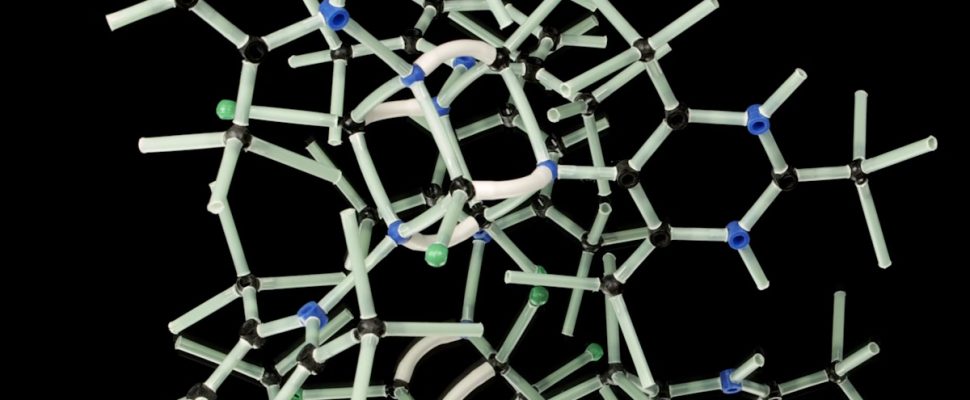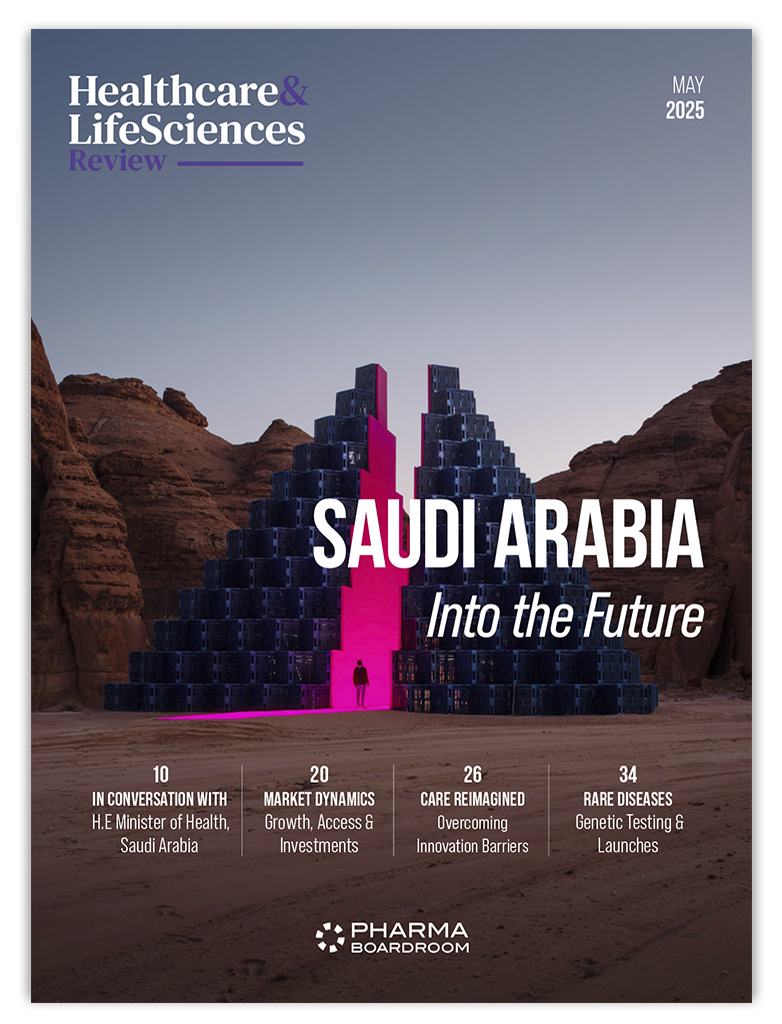Rare diseases, by definition, only affect small patient populations. However, when the more than 7,000 known rare conditions are taken together, their impact on health, societies, and economies is enormous. Moreover, over 90 percent of rare diseases have no known treatment, and rare disease patients often face delayed diagnoses and a lack of specialised care compared to those suffering from more common and well-funded conditions.
From Challenge to Opportunity
These universal challenges are compounded in Saudi Arabia by the presence of many rare genetic disorders that are far more prevalent than in Europe or North America. This is largely due to the high degree of consanguinity in the country and represents a significant burden. However, there are two sides to every coin, and these genetic disorders are serving as a basis for groundbreaking genomic research projects as well as providing opportunities for pharma industry sponsors with well-suited orphan drug portfolios.
Majid Al Fayyadh, CEO of the King Faisal Specialist Hospital and Research Centre (KFSHRC), explains that his institution “has been actively working on rare diseases, identifying mutations and genetic variations prevalent in the Saudi population. Given that genetic disorders are seven times more prevalent in Saudi Arabia than in Western countries, KFSHRC is directing its Research Centre toward pioneering gene therapy solutions that will offer honest, long-term solutions for genetic diseases that currently have no cure. This research is critical in developing targeted therapies for hereditary conditions disproportionately affecting our population.”
A key driver of this effort is the Saudi Human Genome Program, a national initiative aimed at identifying genetic mutations specific to the Saudi population. The program enables earlier diagnosis and targeted treatments for hereditary diseases, shifting healthcare toward precision medicine.
As Ahmed Alaskar, executive director of the King Abdullah International Medical Research Center (KAIMRC) adds, “we have conducted hundreds of whole genome and whole exome sequencing projects on the Saudi population. This effort is part of a larger initiative to link specific gene mutations to particular diseases. Through our work, we have discovered new syndromes and genetic abnormalities that were previously undetected in the Saudi population; a major step forward in understanding genetic disorders and advancing precision medicine in the Kingdom.”
Majed AlJeraisy, executive director of research and education at the Saudi National Institutes of Health (Saudi NIH) recognises the commercial potential of this landscape, calling the elevated incidence of rare genetic diseases “the most compelling opportunity for pharmaceutical investment today.” He adds, “the country’s genetic disease profile presents an unprecedented opportunity for biotech companies specializing in orphan drugs, personalised medicine, and next-generation therapies.”
Tackling Thalassemia
One of the country’s most prevalent – and most devastating – rare diseases is the genetic blood disorder thalassemia. This condition can lead to anaemia and be deadly if patients do not receive regular blood transfusions and proper care.
The Saudi NIH’s AlJeraisy identifies tackling thalassemia as a key investment driver for the country. “Experts suggest that a concerted focus on thalassemia alone could attract significant investment from the pharmaceutical industry, as innovative treatments such as gene therapy and biologics represent the only viable solutions,” he opines.
However, taking on thalassemia – an illness wrapped up with cultural, educational, and awareness issues due to its links to consanguinity – requires more than treatment alone. Bristol Myers Squibb, one of the major players operating in this space, has been working hard to fill the gap.
“At BMS, we partner closely with patient associations to provide education and raise awareness around thalassemia and its management,” says Osama Braiwish, the company’s general manager for Saudi Arabia and the Gulf Countries. “Our objective is to empower these associations with the tools and knowledge they need to support patients and families.”
He continues, “I am particularly proud that premarital testing for thalassemia has become mandatory in the region. This is a significant step forward in preventing new cases of the disease.” The job is not, however, complete. “Despite mandatory premarital testing in many areas, new cases of thalassemia continue to be diagnosed, especially in rural areas, where awareness may be lower, and adherence to testing guidelines may be inconsistent,” laments Braiwish.
The Diagnosis Dilemma
Beyond thalassemia, diagnosis is a major issue across all rare diseases in Saudi Arabia. As Sameh ElFangary, country president for the GCC & Pakistan at AstraZeneca, notes, “it takes an average of seven years for rare disease patients to receive an accurate diagnosis, often after being misdiagnosed and treated symptomatically for more common non-communicable diseases.”
He adds, “Many patients, particularly those in rural areas or underserved parts of the healthcare system, may never receive a diagnosis and, tragically, might die without knowing the nature of their condition.”
One Saudi country manager for a rare disease-focused player underlines the severity of the situation, calling early diagnosis “the most pressing issue for rare disease patients in Saudi Arabia. Many patients remain undetected or are identified too late for effective intervention.”
However, he does point out that “In response, the government is promoting industry collaboration to ensure that innovative therapies reach patients faster.” His firm has created a dedicated local medical team to collaborate closely with healthcare professionals (HCPs). “Through specialised training, diagnostic initiatives, and targeted awareness programs, we are equipping physicians with the tools needed to identify and treat rare diseases earlier,” he says.
As in other fields, the Saudi government is displaying a clear openness to public-private partnerships on the rare disease diagnosis issue. For example, AstraZeneca – which entered the rare disease space with the 2021 acquisition of Alexion – is collaborating with the Ministry of Health to establish a Centre of Excellence. “This initiative focuses on early diagnosis and improving the patient journey to ensure better outcomes,” notes ElFangary.
Retooled Regulation
Regulation is another area which has seen vast improvement in the fight against rare diseases. As the aforementioned country manager notes, “The Saudi government has taken proactive steps to accelerate pharmaceutical innovation, with the Saudi Food and Drug Authority (SFDA) introducing orphan drug designation pathways that streamline regulatory approvals. These reforms allow innovative therapies to enter the market within months, significantly improving access for patients.”
Others are similarly enthusiastic about how quickly the country’s regulatory framework is adapting. Amgen, which recently acquired the rare disease biotech Horizon Therapeutics, is one. “Amgen’s experience with the Saudi FDA has been exemplary, characterized by a strong and constructive partnership,” says Lyes Salah, general manager of the US giant’s Saudi affiliate.
“This collaborative approach has enabled Amgen to achieve remarkable regulatory milestones, including the approval of a rare disease therapy where Saudi Arabia became the first country, after the United States, to register the product. Such achievements highlight the SFDA’s dedication to fostering a regulatory framework that supports swift and efficient processes. Today, products can be registered within 12 months, a pace that positions Saudi Arabia ahead of regions like Europe and Japan in terms of market entry.”
All these factors together show that Saudi is moving swiftly to address the specific challenges of rare disease in the country. However, as one country manager points out, “addressing rare diseases requires more than regulatory efficiency. Building awareness and strengthening local medical expertise are essential to ensuring effective diagnosis and treatment.”


